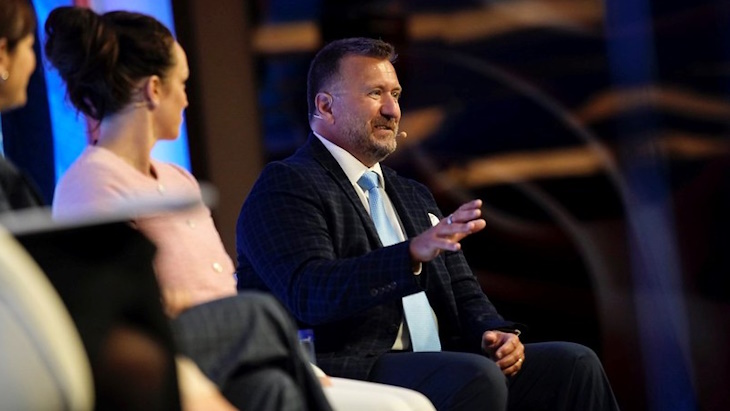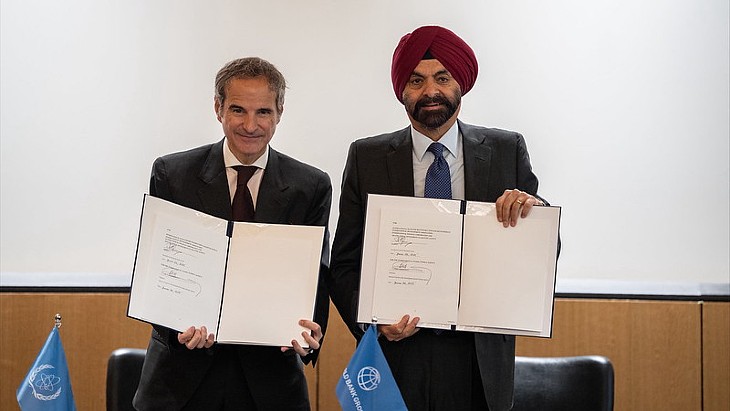EDF posts 3.7% fall in profit amid lower output
EDF recorded a 3.7% year-on-year fall in net income and a 2.6% dip in sales in the first half of this year - to €2 billion and €35.7 billion - with its nuclear power generation impacted by unplanned outages. The French state-owned group said the results were in line with expectations, despite the launch earlier this year of a €4 billion capital increase.
French nuclear power output fell by 3.9% year-on-year to 197.2 terawatt hours in the six months to 30 June, while lower wholesale electricity prices spoiled the 4.2% rise in its UK subsidiary EDF Energy's nuclear power production to 32.2 TWh. The group's hydropower generation was also down 16.5%.
Jean-Bernard Lévy, EDF chairman and CEO, said on 28 July: "In an unfavourable market context and in line with its forecasts, the Group is continuing to implement its performance plan and maintains its annual objectives. Based on its strengthened balance sheet, EDF is deploying its CAP2030 strategy."
That strategy of 'being an efficient, responsible electricity company that champions low-carbon growth' is based on three goals. These are to be closer to its customers and helping them to better understand and manage their energy consumption; doubling its global capacity in renewable energy as well as extending the life of its existing French nuclear fleet through the Grand Carénage program and developing new nuclear; and trebling its business activity outside France.
Nicolas Hulot - who French President Emmanuel Macron appointed as the country's new energy minister when he formed a government in May - has said France could close as many as 17 nuclear units by 2025.
Lévy said the first half of 2017 was marked by an acceleration in the area of renewable energy with, in particular, the takeover of Futuren and the increase in installed net capacity. The reorganisation of the French nuclear sector has also reached "essential and positive milestones" in recent months, he added.
The group listed four developments for its nuclear business during the reporting period. First, the approval of the Flamanville 3 vessel, with the French Nuclear Safety Agency (ASN) "specifying that the composition of the steel of the vessel head and bottom is not likely to call into question its commissioning under certain conditions and, in particular, the replacement of the vessel head by the end of 2024". Second, an update of EDF Energy's Hinkley Point C project in Somerset, England, that puts its cost at GBP19.6 billion, 8% higher than the group's original estimate. Third, the formation of Edvance, a new company focused on the supply of nuclear islands, of which EDF will hold 80% and Areva NP 20%. Finally, the signature of binding agreements with strategic investors for the acquisition of an equity stake in New NP - Mistubishi Heavy Industries will take a stake of 15% (and potentially up to 19.5%) in New NP, while Assystem will take a 5% stake.
EDF Energy leadership
Meanwhile EDF Energy has announced changes to its leadership team as it proceeds along the path of EDF Energy 2020 - its contribution to the EDF Group's CAP2030 strategy.
EDF Energy CEO Vincent de Rivaz announced the changes to the executive responsibilities for its generation and new nuclear build activities on 27 July.
Humphrey Cadoux-Hudson will take on the newly created role of Nuclear Development Managing Director to oversee EDF Energy's future nuclear new build development projects, Sizewell C and Bradwell B, working with EDF's strategic partner, China's CGN, to establish a new build series program. In addition, he will take charge of the creation of a new waste and decommissioning business for the existing advanced gas-cooled reactor (AGR) fleet. He will also manage EDF Energy's contribution to the development of small modular reactors.
As Hinkley Point C Managing Director, Stuart Crooks will take charge of the project now that it has entered fully into its construction phase. Currently managing director of the company's generation business, Crooks will draw on recent project reviews of Hinkley to maintain control of schedule and cost risks. He will also establish the nuclear operations arrangements for the project, building on the existing strengths of the UK operating fleet and the experiences of EPR operations from Flamanville in France and Taishan in China.
As Generation Managing Director, Brian Cowell will be responsible for all of EDF Energy's existing nuclear, coal, gas and renewables operations. Currently director of nuclear operations for EDF Energy's nuclear fleet, Cowell will oversee work to identify further nuclear life extension opportunities, optimise end of AGR lives and plan for the phased closure of its coal plants. Through the EDF Energy Renewables joint venture, he will also seek to develop further the company's UK renewables capacity.
The changes are expected to be in place by September.
Researched and written
by World Nuclear News
_77790.png)
_59102.jpg)
_49833.jpg)






..._58412.jpg)

